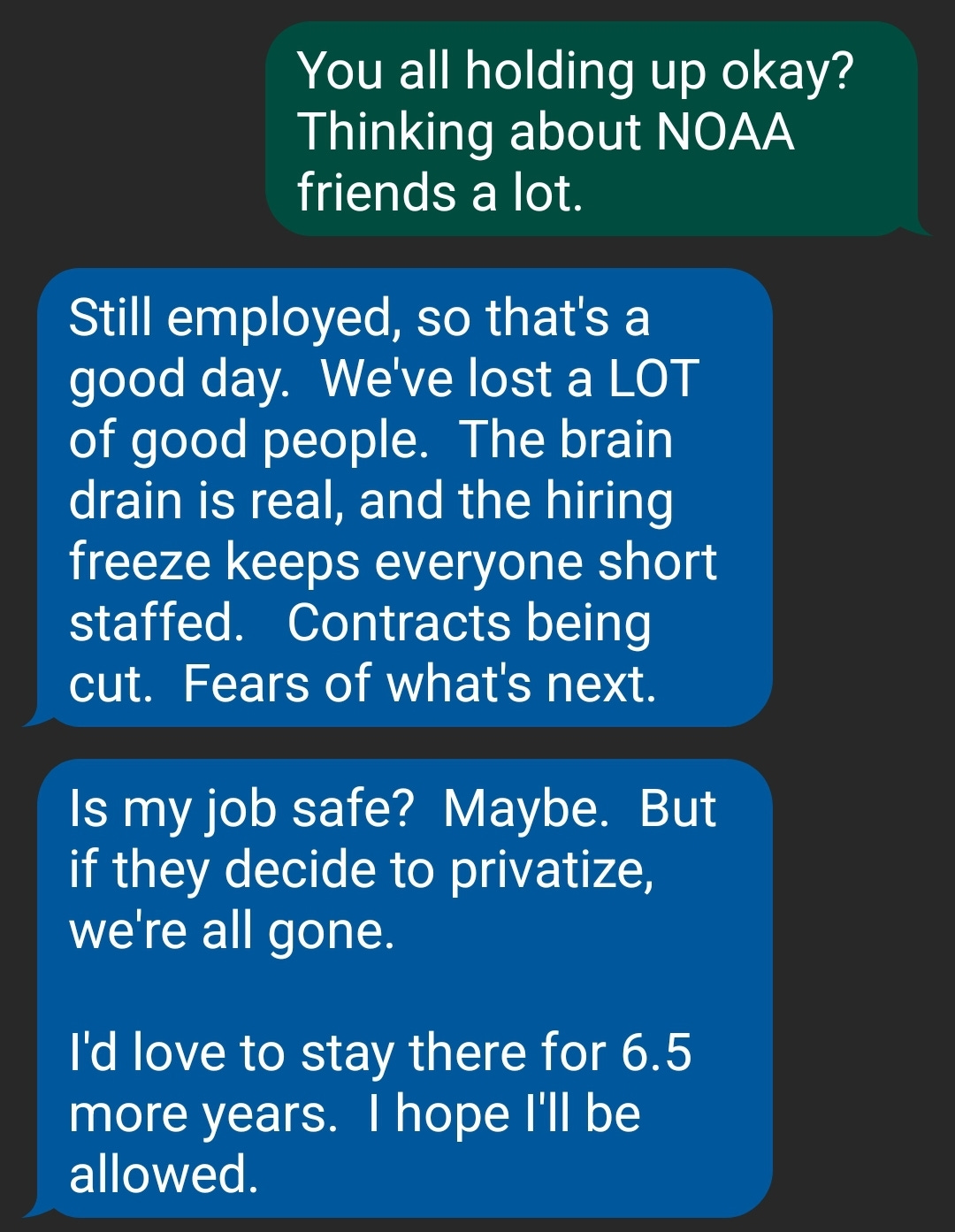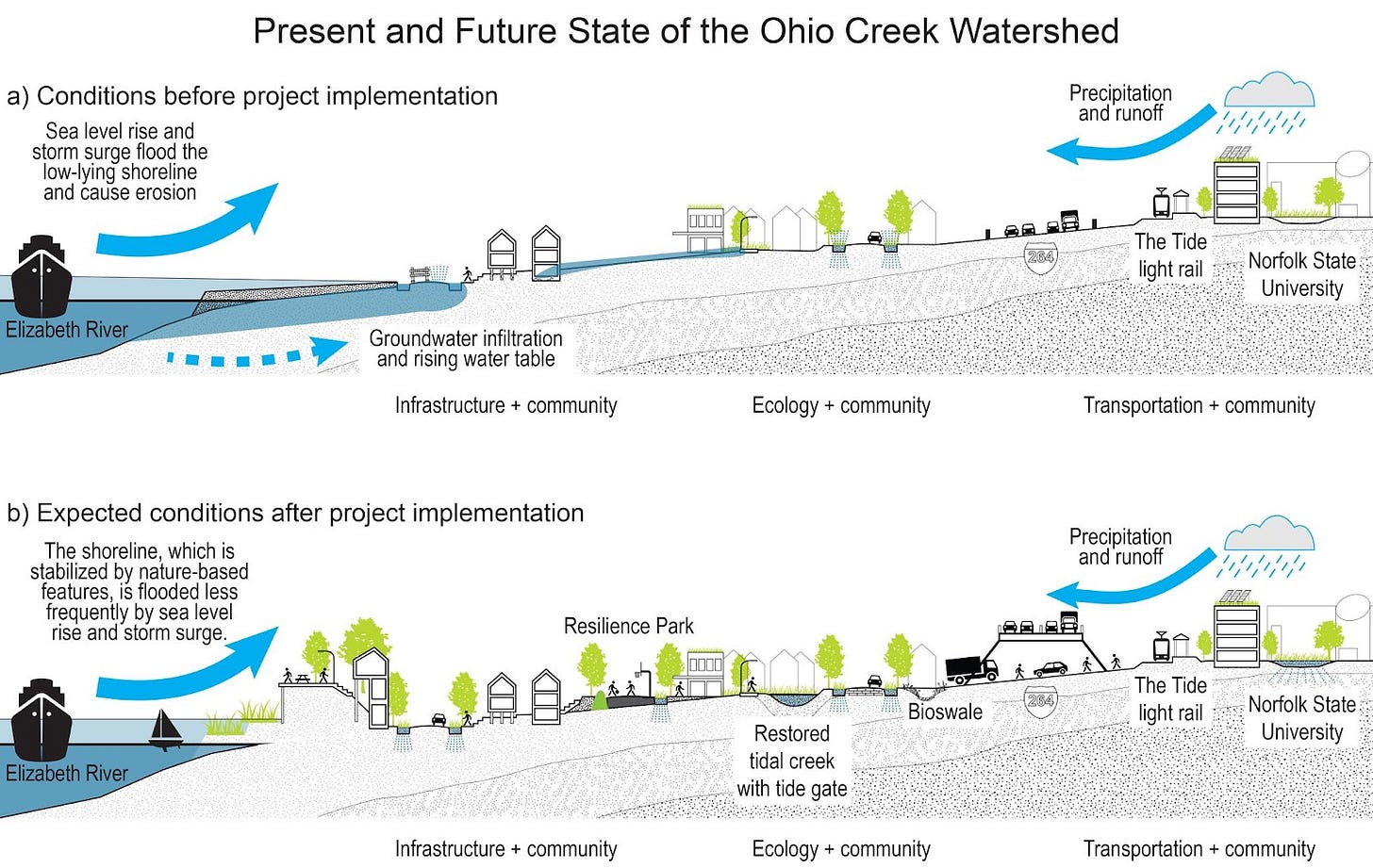4pm Wednesday, April 30, 2025
The rest of this week in Richmond will feel more like early June.
Thursday and Friday afternoons will average in the 80s and the nights will stay above 60, encouraging those reluctant to turn on their air conditioners to finally do so before the weekend arrives.
The warmer nights will result from the higher humidity over the next couple of days. Although it will not be stifling like we get in July and August, humidity will remain noticeably higher compared to earlier this week.
Seeds of Drought? Or Filling up the Pond?
Somewhat quietly, it has gotten dry in Richmond over the last couple of weeks. There were some healthy, but short-lived thunderstorms scattered around central Virginia last Saturday, but most of the significant rain missed the city limits just to the north or the south — meaning many places have had less than quarter-inch of rain over the last two weeks.
With days getting longer and the sun higher in the sky, evaporation from soils is much greater than just a month ago, so the ground dries out more quickly after a soaking rain. May brings the start of solar summer, the three month period of the year when the sun is highest in the sky and the days are the longest.
This differs from astronomical summer, which starts on the day of the solstice — when the sun is highest in the sky at noon. This year, that happens on June 20.
While it is too early to worry about drought right now in Richmond, much of the state north and west of Richmond has turned abnormally dry, with Northern Virginia and the Shenandoah Valley already in a moderate drought.
Richmond’s two soaking rains during the first half of April have kept us out of those categories, at least for now. But streamflow is below normal for most of the state between the Blue Ridge and the Chesapeake Bay, with some streams in Southside and Northern Virginia in their lowest 10 percent of all observed stream flows.
There is room for cautious optimism to get some rain, although the timing is not ideal.
The surge in warmth and humidity this week will help spawn scattered showers and thunderstorms, although they look few and far between between now and Friday.
A stronger system pushes through on Saturday, bringing a better chance for a few hours of rain, then Sunday and next week are a bit of a crap shoot.
There are signs that a broad area of low pressure forms in the middle levels of the atmosphere and spins over the Southeast for a few days — starting on Sunday. Depending on its precise location, we could get several additional rounds of rain Sunday through Tuesday of next week, and that would put away any discussion of drought for a while.
However, there is still a lot of uncertainty, as there is an unusual amount of inconsistency in the data. Nonetheless, this wetter idea for Sunday and the first couple of days next week appears more plausible than 24 hours ago.
We should know better by Friday morning.

Losses in the National Weather Service
Jared works for a key NOAA data center in western North Carolina (where rebuilding and recovery from Hurricane Helene continues). The exits are from coast to coast, and most are a direct result of reckless and thoughtless cuts to NOAA from the current administration.
Last week, I chatted with a friend from college, who has essentially been in NOAA his entire career. He and I caught up at a conference in person about a year ago, where he was showing how to make the IT systems in the National Weather Service more efficient.
It is very fashionable for Republicans to mock federal workers. But these NOAA people are truly public servants — making things work behind the scenes so you do not have to worry about them.
You may not notice a change tomorrow, next week, or even later this year. But when our global leadership in weather research and forecasting is gone later this decade, look back to these last 100 days for the reason why.
NOAA returns $73 to the economy for every $1 in its taxpayer-funded budget.
It is a tremendous value for the American people that is needlessly being thrown away.
Starving the National Climate Assessment
Late Monday, the scientists and staff working on the sixth federal National Climate Assessment (NCA) were informed their services were no longer required.
Meade Krosby, a Senior Scientist at the University of Washington posted:
Watch her 90-second interview with CNN International from Tuesday night.
The NCA is a periodic review of the physical science of climate change and its impacts on the people and security of the United States. Congress mandated these reports via the Global Change Research Act, signed into law by President George H.W. Bush in November 1990.
The most recent NCA, version 5, was released in 2023, and the next update is scheduled for 2028. But its future is now in question.
Scientists across different labs and institutions, both public and private, volunteer their time in putting together the comprehensive report. One of the many Virginia authors of NCA5, speaking to me anonymously, discussed the importance and veracity of the report.
“It has to be based on information meeting the Federal Information Quality Act, which generally means peer reviewed literature, state or local government reports, and, under certain conditions, Indigenous knowledge. Its authors are all volunteer and vetted through a rigorous selection process.”
The NCA covers the impacts of the warming climate on agriculture, transportation, health, ecosystems, and several additional topics at regional and local levels nationwide. By design, it is policy neutral, but it does highlight where solutions can be implemented to reduce impacts.
For example, around Hampton Roads, the average water level has risen 1.6 feet in the last 100 years. The rise is accelerating, and now there are typically 10-15 high tide floods each year.
Waterside flooding at high tide in the next 25 years is expected to be 8-10 times more frequent than today, so part of Chapter 9 of NCA5 highlighted a method to use natural defenses to successfully adapt to the sea level rise affecting a Norfolk community where the Ohio Creek drains into the Elizabeth River.
But the research on the warming climate and learning how we can adapt to it are now both at serious risk. Given the sudden and deliberate starving of funds previously earned by federal scientific institutions like NOAA, the National Institutes of Health, and the National Science Foundation, it seems unlikely NCA6 will continue in the manner authorized by Congress.
In fact, there is an ominous tone to the dismissal email, to suggest NCA6 will go forward, but with no scientific rigor or expertise — simply appearing as a mish-mash of propaganda reminiscent of the old Soviet Union.











